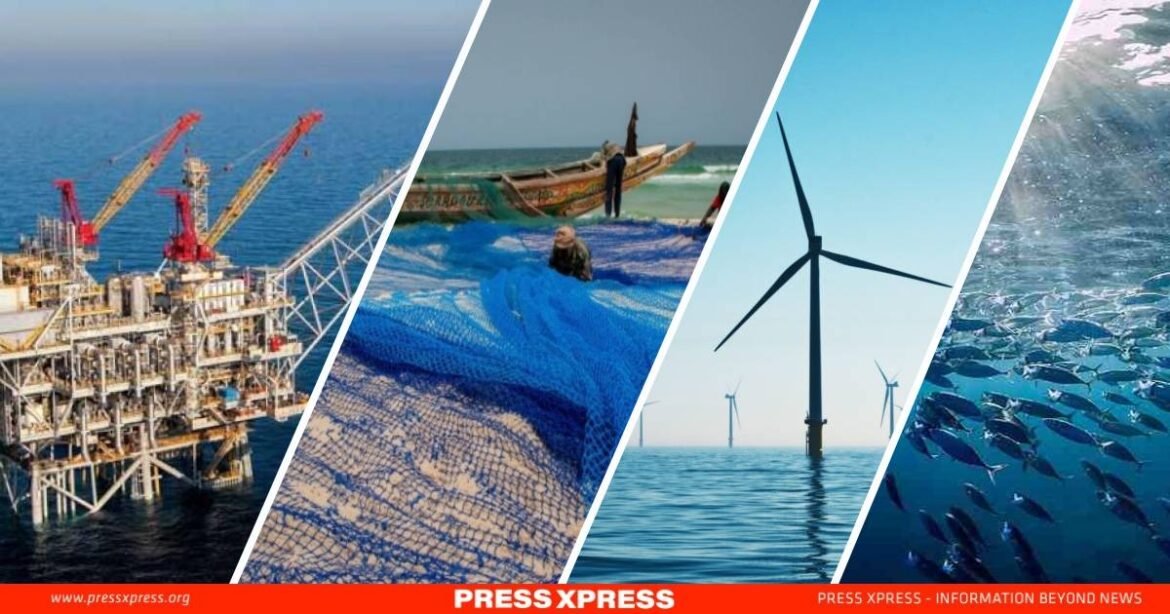Bangladesh’s strategic location along major maritime routes positions it as a potential hub for trade and transportation. With its extensive coastline along the Bay of Bengal, the country’s blue economy plays a critical role in its overall growth and development.
The blue economy of Bangladesh encompasses various sectors, including fisheries, aquaculture, maritime trade, and coastal tourism. These sectors contribute significantly to the country’s GDP and provide employment opportunities for millions of people. Bangladesh has established itself as one of the world’s largest producers of fish and shrimp, with the fisheries sector alone accounting for approximately 3.5% of the country’s GDP.
You can also read: Bangladesh’s Path to Export Growth in China: An Insights
According to ADB Vice President Yingming Yang, Bangladesh’s blue economy could double within the next 10 to 15 years. Key areas for development include modernizing ports, enhancing shipping infrastructure, and improving logistics. Additionally, there are opportunities to harness offshore renewable energy and develop coastal tourism through infrastructure improvements and sustainable practices.

Economic Opportunities for Bangladesh
Bangladesh’s blue economy presents significant economic opportunities, particularly in maritime trade and renewable energy sectors. The development of ports, shipping infrastructure, and logistics is crucial for enhancing the country’s position in global trade networks.
Bangladesh’s three major seaports – Chittagong, Mongla, and Payra – handle over 90% of the country’s trade volume. These ports serve as vital gateways connecting Bangladesh to international markets. However, to fully capitalize on its strategic location, Bangladesh needs to modernize its port facilities and improve operational efficiency. Enhanced port infrastructure can reduce shipping costs, minimize delays, and increase the country’s competitiveness in maritime trade.
The shipping sector plays a key role in facilitating Bangladesh’s exports, particularly in the readymade garment industry. This industry employs approximately 4 million people, with 60% of the workforce being women. Improving maritime logistics can support the growth of this sector and help diversify the economy, reducing dependence on a single industry.
Renewable energy presents another promising avenue for economic growth within the blue economy framework. Bangladesh has the potential to harness offshore wind, wave, and tidal energy sources along its coastline. Developing these renewable energy resources can help meet the country’s growing energy demands, reduce reliance on fossil fuels, and contribute to climate change mitigation efforts.
Investing in offshore renewable energy infrastructure can create new jobs, foster technological innovation, and attract foreign investment. It can also support the country’s goal of increasing the share of renewable energy in its power mix.
To fully leverage these economic opportunities, Bangladesh will need to implement supportive policies, attract investment in infrastructure development, and build capacity in maritime and renewable energy sectors. The Asian Development Bank and other international partners can provide technical assistance and financing to support these initiatives.

ADB’s Role and Funding Modalities
The Asian Development Bank (ADB) plays a crucial role in supporting Bangladesh’s blue economy development through various funding modalities and technical assistance. ADB’s support spans multiple sectors, including maritime infrastructure, coastal resilience, and sustainable resource management.
ADB has developed a $1.5 billion pipeline for Bangladesh over the next three years, from 2025 to 2027. This funding allocation includes specific components targeting the blue economy, such as coastal resilience initiatives, wetlands management, and river system management. These investments aim to enhance Bangladesh’s capacity to sustainably utilize its maritime resources while building resilience against climate change impacts.
To support innovative financing in the blue economy sector, ADB is developing new solutions such as the Natural Capital Fund and the Nature Solutions Finance Hub. These initiatives seek to provide and attract capital for natural capital projects, including those in the blue economy. By leveraging these funding mechanisms, ADB aims to catalyze additional investments from both public and private sectors.
ADB’s support extends beyond direct financing. The organization’s Natural Capital Lab, in collaboration with Stanford University, conducts natural capital assessments and accounting. These science-based methods help identify appropriate areas for investment in coastal ecosystems, ensuring that nature-based solutions are implemented at scale. This approach also supports innovative financing mechanisms like Payment for Ecosystem Services, which hold significant potential for sustainable development.
In its efforts to maximize impact, ADB is collaborating with other development partners, including the Embassy of the Netherlands, the International Fund for Agriculture Development, and the World Bank. These partnerships aim to create synergies and avoid duplication in blue economy initiatives.
ADB’s Prediction for Bangladesh’s Blue Economy
The Asian Development Bank (ADB) forecasts significant growth for Bangladesh’s blue economy in the coming years. According to ADB Vice President Yingming Yang, Bangladesh’s blue economy has the potential to double in size within the next 10 to 15 years.
This prediction is based on several factors that position Bangladesh favorably in the maritime sector. Yang points out that Bangladesh is strategically located along major maritime routes, making it a potential hub for trade and transportation. The country’s extensive coastline along the Bay of Bengal provides a strong foundation for various blue economy activities.
Yang emphasizes the critical role of the blue economy in Bangladesh’s overall growth. He notes that Bangladesh is already one of the world’s largest producers of fish and shrimp, indicating a strong base in the fisheries and aquaculture sectors.
The ADB vice president highlights key areas for development that could drive this growth:
- Port development and shipping infrastructure improvement
- Enhancement of logistics related to maritime trade
- Harnessing renewable energy from offshore sources such as wind, waves, and tides
- Coastal tourism development
Yang stresses that infrastructure development in coastal regions, combined with sustainable tourism practices, is essential for maximizing the benefits of the blue economy. He also points out the importance of building resilience and adaptation to climate change, given Bangladesh’s vulnerability to rising sea levels and extreme weather events.
To realize this potential, Bangladesh must prioritize infrastructure development, particularly in ports and shipping facilities. Sustainable management of marine resources is crucial for long-term economic benefits and environmental conservation. The country’s strategic location and extensive coastline provide a strong foundation for these initiatives.


